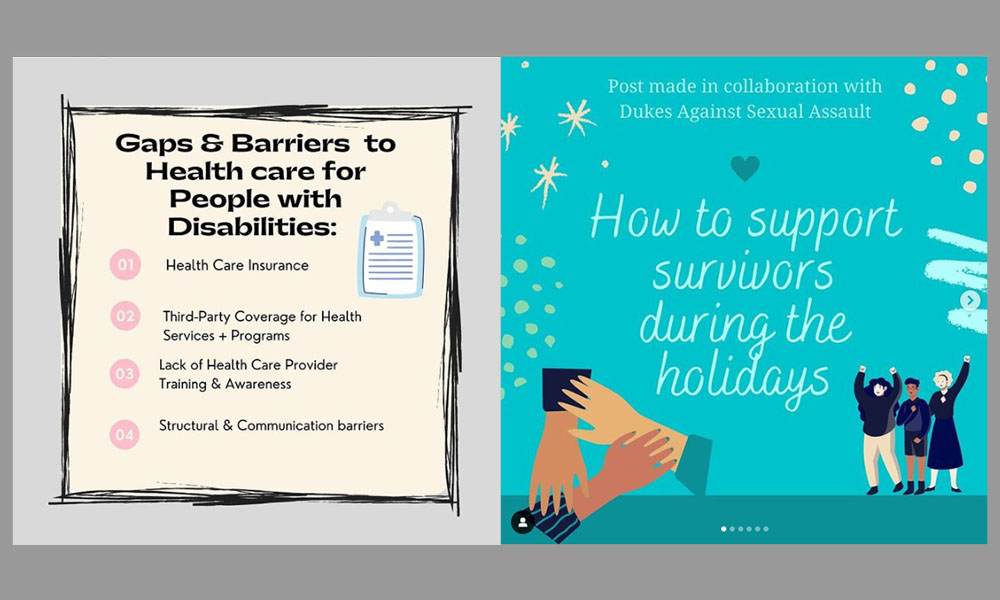Social Work students promote advocacy through social policy
News
“Advocacy is so important because there’s a lot going on in the U.S. and around the world right now,” social work professor Hyong Yeom said. “There are issues of racial justice, racial equity, social justice, economic justice and environmental justice. All of these issues are important for a social work student to be aware of and to advocate for because you’re not just dealing with one type of clinic or patient.”
Students in Yeom’s social policy and social work practice in macro systems classes are tasked with learning about racial, social, economic and environmental justice issues and how to advocate for them in policy, organization and community contexts. In these classes, students are assigned to groups where they decide on an area of advocacy they feel strongly about.
“I want students to find social justice issues that they’re passionate about, to raise consciousness of the issues in the communities, and to engage with the communities for systemic and sustainable social change,” Yeom said.
Yeom added that due to Covid-19, students recently have started to utilize social media platforms as well as other innovative ways to promote advocacy in the assignments.
Two of the groups this semester are focusing on sexual assault and disability rights. Both groups have shared information about their topics using in-person communication and social media to spread awareness.
One group of senior social work students in Yeom’s macro class founded Dukes Against Sexual Assault, an Instagram page that is working to educate the JMU community about sexual violence and to bring awareness to the issue.
The group picked this topic due to the prevalence of sexual assault on college campuses across the United States. They said while sexual assault is sadly very common, not many people are aware of what the definition of it actually is.
“We want to bring awareness to this and the fact that there isn’t one black and white definition of what sexual assault is,” Kesem Solell-Knepler said. “I don’t think people realize how broad [sexual assault] really is; they think it’s this clear-cut thing when it’s really not. We’re trying to bring advocacy to the fact that it’s such a broad spectrum but is also a very common issue.”
While researching the topic, Natalie Rose-Ross said she learned a lot about sexual assault and was surprised by how common it is on college campuses.
“One of the things that I didn’t realize before this project is how pervasive rape culture is in college,” Ross said. “It’s so normalized and awful, but it’s there. We need to bring awareness to resources that are available. We need to not be afraid of calling out people who contribute to rape culture because otherwise it’s swept under the rug and not talked about.”
Dukes Against Sexual Assault have been educating themselves on the issue of sexual violence during this class, but they also want to educate students and the community.
“I feel like people don’t think about how bad it really is,” Solell-Knepler said. “We’re just one college campus in Virginia, but there are millions of campuses across the country so I think it’s important that colleges have people talking about the topic and raising awareness because it is so prevalent.”
Along with raising awareness about sexual violence, another group of junior social work students in Yeom’s social policy class is working to educate students about disability rights in health care. Nicole Hillman said that disabled people often get overlooked when it comes to activism.
“A lot of us either have a disability or know someone who does,” Hillman said. “We want to bring attention to disability rights because we recognize that it’s not something that is typically taught in classes and needs to be looked into more.”
Through researching disability rights in health care, the group said they have become more aware of the unique struggles that individuals with different disabilities face. When it comes to learning about disabilities, Jared Joyner said that from an early age we’re only taught about the most common ones such as anxiety and depression and are never made aware of the fact that there are so many different disabilities that people struggle with.
“There are so many disabilities that we should know about because they are a major part of someone,” Joyner said. “November is Epilepsy Awareness Month and I bet most people at JMU don’t know about that. We want to make sure that everyone is loved for themselves and not just as someone with a disability and we want to show what disabled people have to go through.”
While Dukes Against Sexual Assault and the group dealing with disability rights are both handling very different topics, they both agree their respective social work classes have helped them learn more about systemic issues in America and have taught them how to be an even better advocate when they go out into the workforce.
“Advocacy is something that’s a core value in social work,” Erin Gallagher said. “Before we even came in as social work students, I think a lot of us were already passionate about being advocates for many different groups. Our own beliefs have translated into this project as we’ve learned more and advocacy is something that we as future social workers really value.”
